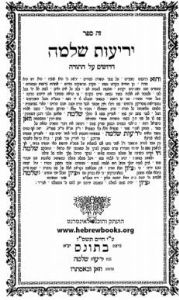A Short Tribute
Hacham Shlomo Vazan, son of Yehuda, was born in Tunis. His father died while he was still a child. His mother, in her sorrow, donated all her husband's books to the synagogue, so that many of his writings were lost. Hacham Sholmo Vazan studied Torah with Hacham David Injar in Tunis.
Hacham Shlomo Vazan officiated as a rabbi in the city of Sousse in Tunisia and, in 1773, was the one who welcomed Maran HaHID"A when he came to visit that city. Hacham Shlomo Vazan also officiated as dayan and preached in the towns surrounding Tunis.
Hacham Shlomo Vazan passed away on 16 Nissan, 1812. He authored Yeriot Shlomo, containing sermons on the Torah, published after his death.
